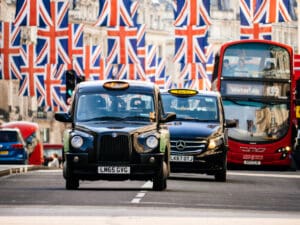London’s iconic black cabs could all but vanish by 2040, warn long-serving cabbies who have seen their ranks thin by a third in the past decade.
At the heart of the crisis are mounting pressures to switch to electric vehicles, an ageing workforce reluctant to invest in pricey new taxis, and city-wide “anti-car” measures that drivers say make it harder than ever to serve passengers swiftly.
The scale of the downturn in driver numbers is striking: from a record high of 25,538 in 2014, figures from November 2024 show only 16,965 now remain—a 33.6 per cent fall. While demand for black cabs has stayed strong, the pool of available vehicles and drivers is steadily draining, with many nearing retirement and fewer newcomers taking the plunge.
Steve McNamara, head of the Licensed Taxi Driver’s Association, believes cabbies are being taken for granted. He claims that a proliferation of low traffic neighbourhoods, along with a maze of cycle lanes and 20mph restrictions, has turned London into a place “virtually impossible” to navigate. “They’ve built a road network for white middle-class men using cycle lanes to the detriment of the majority of Londoners,” he says. “It’s incredibly stressful and a lot of people think, ‘I can’t do this anymore.’”
For drivers who remain on the road, earnings have been buoyant. Fewer taxis in circulation means black cabs now control a bigger slice of the market, enabling some drivers to earn as much as £100,000 a year. Even so, Transport for London (TfL) is considering raising fixed fares by a further 7.5 per cent in 2025, on top of recent hikes totalling more than 15 per cent since 2022.
Ironically, those rising fares have not dampened passenger demand. Yet cabbie Tom Hutley worries about how rising prices, coupled with re-routed journeys due to road restrictions, will affect customer perceptions. “If it takes twice as long and costs £15 instead of £10, people might choose a different option next time,” he warns.
The ever-growing number of private hire vehicles, including Uber, once threatened to undercut black cabs with low-cost fares. However, a combination of surge pricing and inflationary pressures has made black cabs more competitive. “We’re no longer necessarily more expensive than Uber,” McNamara says. For many passengers, a metered taxi with a regulated tariff now feels no different in price.
Despite the environmental upsides, the shift to electric taxis poses a financial barrier for many drivers. A new electric black cab can cost up to £80,000, or £100,000 on finance. Around 60 per cent of London’s black cabs are now zero-emission vehicles, but part-time drivers and those nearing retirement are reluctant to invest so heavily. Diesel taxis must be taken off the road at 12 years old under TfL’s green policies, meaning older vehicles with plenty of life left can no longer operate.
“I’m in my 60s and don’t plan on shelling out £80,000,” one veteran cabbie explains. “I haven’t got an issue with electric, but I won’t be doing that.” Previous grants of up to £10,000 to scrap older diesel taxis have ended, leaving drivers with fewer incentives to upgrade.
The Knowledge—London’s famed requirement to memorise 25,000 streets—still attracts newcomers, yet not enough to offset the mass of drivers reaching retirement. TfL data shows 62 per cent of current cabbies are over 53, with limited interest among younger generations to replace them.
Neil Garratt of the London Assembly says the city’s black cabs are “at a crossroads” and has urged the Mayor to act quickly: “Black cabs are a vital means of transport, and it’s within the Mayor’s powers to secure their future.”
TfL’s Graham Robinson adds that a revised action plan is in progress to support “hard-working black cab drivers”. Funding, he says, has helped many switch to greener vehicles, along with improving the city’s taxi ranks and widening access to bus lanes. But for many cabbies, these measures might be too little, too late to save an industry on the brink.

















